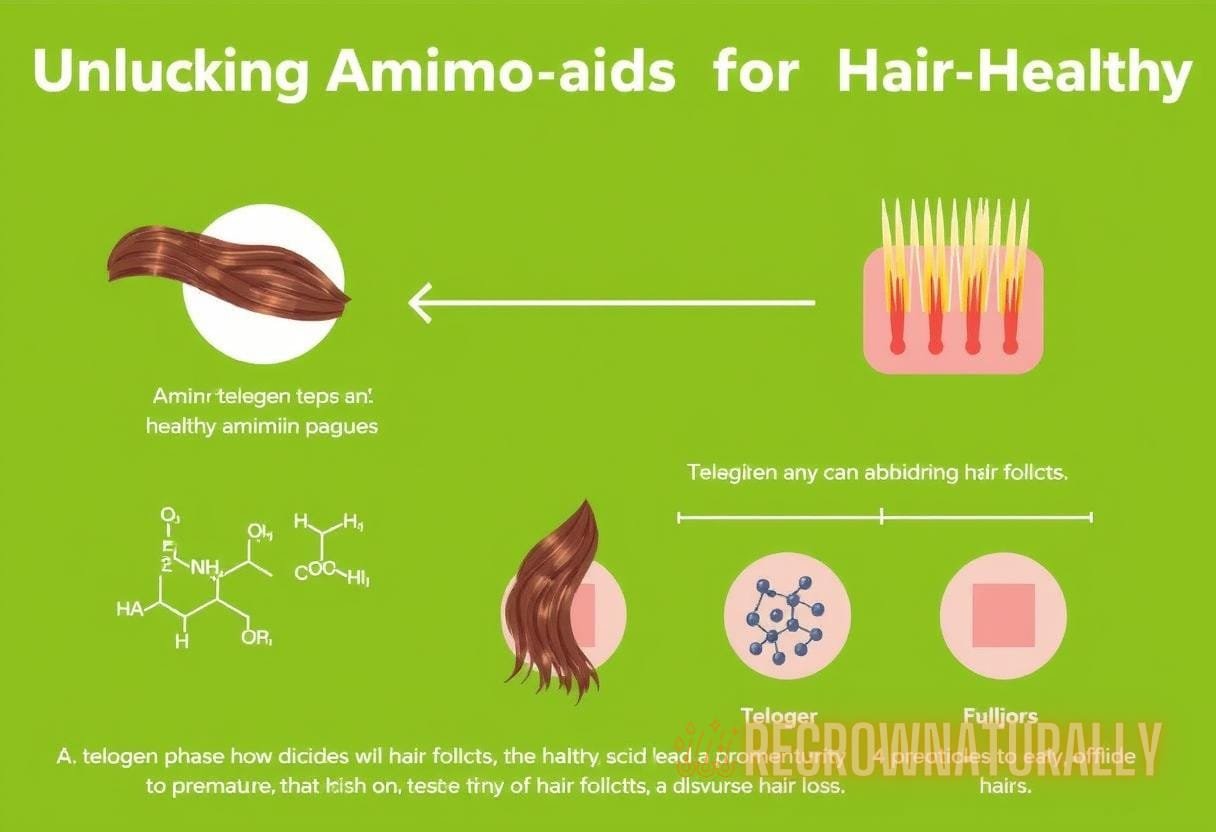The Biomolecular Blueprint: Understanding How Amino Acids Fuel Hair Health
The health of our hair is often a reflection of our overall nutritional status, and at the very core of this are amino acids. Amino acids are the building blocks of protein, and they play a critical role in the biochemical functions that support hair structure and growth. Understanding how amino acids influence hair health can lead to better dietary choices and a more profound understanding of hair care.
What Are Amino Acids?
Amino acids are organic compounds composed of carbon, hydrogen, oxygen, nitrogen, and sometimes sulfur. They serve as the foundation of proteins, which are critical for a multitude of bodily functions. Out of the 20 amino acids, 9 are deemed essential, meaning that they must be obtained through diet, while the remaining 11 can be synthesized by the body. The essential amino acids include:
- Histidine
- Isoleucine
- Leucine
- Lysine
- Methionine
- Phenylalanine
- Threonine
- Tryptophan
- Valine
Among these, a select few are particularly significant for maintaining amino acids hair health. These include cysteine, methionine, and arginine, all of which contribute uniquely to the health and growth of hair follicles.
The Role of Amino Acids in Hair Structure
The structure of hair primarily consists of a protein known as keratin, which is made up of amino acids. Keratin provides strength, resilience, and elasticity to hair. The precise arrangement and sequence of amino acids in keratin are critical for the mechanical properties of hair.
Studies have shown that a deficiency in specific amino acids can lead to compromised hair structure. For instance, a lack of cysteine can lead to weak and brittle hair, often resulting in split ends and breakage. According to a study published in the Journal of Cosmetic Dermatology, sulfur-rich amino acids such as methionine and cysteine are pivotal for ensuring robust hair growth and preventing hair loss.
Key Amino Acids for Hair Health
Below, we delve into some of the key amino acids that significantly impact hair health, exploring their unique contributions:
- Cysteine: As a sulfur-containing amino acid, cysteine is vital for the formation of keratin and aids in the structural integrity of hair strands.
- Methionine: Another sulfur-containing amino acid, methionine plays a crucial role in protein synthesis and acts as an antioxidant, combating oxidative stress that could damage hair.
- Arginine: This amino acid is essential for improving blood circulation to the scalp, thereby enhancing nutrient delivery to hair follicles, which is vital for hair growth.
- Glycine: As a simple amino acid, glycine contributes to the synthesis of collagen, which is crucial for strengthening hair roots.
- Proline: Proline helps the body produce collagen and keratin, further supporting the structural components of hair.
Amino Acids and Hair Growth Processes
Understanding how amino acids interact with bodily processes provides insight into how they contribute to hair growth. Hair growth occurs in a cycle, traditionally divided into three stages: anagen (growth), catagen (transitional), and telogen (resting). Certain amino acids have been shown to play more significant roles during these stages.
The Anagen Phase
During the anagen phase, high levels of cysteine and methionine are required. Cysteine directly impacts the quality and strength of hair produced during this period. Research indicates that dietary supplementation with these amino acids can extend the anagen phase and potentially reduce the rate of hair shedding.
The Catagen Phase
The transition between growth and rest, or the catagen phase, can be influenced by amino acid levels. A lack of vital amino acids during this phase may shorten hair growth cycles, leading to thinning hair and increased fallout.
The Telogen Phase

Finally, the telogen phase can be adversely affected by an inadequate supply of essential amino acids. When the body is deficient in crucial nutrients, hair follicles can enter the resting phase prematurely, resulting in diffuse hair loss.
Dietary Sources of Amino Acids
Ensuring a sufficient intake of amino acids through diet is essential for amino acids hair health. The following foods are rich sources of the amino acids relevant for hair care:
- Meats: Chicken, beef, and turkey are excellent sources of cysteine, methionine, and arginine.
- Fish: Salmon and tuna not only provide high-quality protein but are also rich in these crucial amino acids.
- Eggs: Eggs are a powerhouse of essential amino acids necessary for hair health.
- Nuts and Seeds: Almonds, walnuts, and sunflower seeds are great plant-based sources of amino acids.
- Dairy Products: Milk, yogurt, and cheese contain amino acids and can help support overall protein intake.
- Legumes: Beans, lentils, and peas are good sources of amino acids for vegetarians and vegans.
Incorporating a variety of these foods into your diet can provide your body with the necessary substrates to maintain healthy hair.
Factors Affecting Amino Acid Levels
There are various factors that can affect the growth and maintenance of hair through amino acids. Understanding these factors can help mitigate potential hair health issues:
- Diet: A diet low in protein or specific amino acids can lead to compromised hair quality.
- Age: As we age, our body’s ability to absorb nutrients, including amino acids, can decrease, affecting hair growth.
- Health Conditions: Conditions such as anemia or thyroid disorders can impact hair health by interfering with amino acid metabolism.
- Stress: Psychological stress can lead to increased hair shedding, potentially linked to the body’s response to nutrient deficiencies.
Amino Acid Supplementation for Hair Health
For those concerned about hair health, amino acid supplementation can be an option worth considering. Supplements specifically targeting hair growth often contain a blend of amino acids, including:
- Cysteine and Methionine
- Arginine
- Biotin
Research has shown mixed results regarding the efficacy of amino acid supplements for hair growth. However, a study in the International Journal of Trichology demonstrated noticeable improvement in hair density and thickness in individuals supplementing with specific amino acids compared to placebo groups.
The Biochemical Pathways of Hair Growth
At the molecular level, amino acids influence numerous biochemical pathways that govern hair follicle function. For instance, their involvement in keratin synthesis and cell signaling pathways enhances hair follicle proliferation and survival. Key protein factors and growth factors such as vascular endothelial growth factor (VEGF) and fibroblast growth factor (FGF) are affected by the availability of amino acids.
Hair Condition and Amino Acids: Case Studies
Real-world examples illustrate the essential role of amino acids in hair health. A significant study conducted on women experiencing hair thinning revealed that those who supplemented their diet with cysteine and methionine showed a 50% increase in hair thickness after six months. Another case study on individuals undergoing chemotherapy indicated that an amino acid-rich diet facilitated quicker recovery and hair regrowth compared to a standard diet.
Hair Care Products and Amino Acids
Many topical hair care products also harness the power of amino acids to promote healthy hair. Ingredients such as hydrolyzed keratin, collagen, and silk proteins are commonly found in shampoos and conditioners designed to enhance hair strength and shine. These products leverage amino acids’ protective properties, helping to replenish lost protein and maintain hair elasticity.
Conclusion: Harnessing the Power of Amino Acids for Hair Health
In conclusion, the importance of amino acids in supporting amino acids hair health cannot be overstated. Their biochemical functions emphasize the need for a well-rounded diet rich in these compounds. Based on scientific insights into their roles in hair structure and growth processes, it is clear that introducing hair-healthy amino acids into your diet or routine can augment hair strength and vitality. Additionally, as research continues to advance, understanding the molecular dynamics that govern hair health will allow for more targeted interventions, whether through dietary changes, supplementation, or topical applications. With a scientific exploration into the contributions of amino acids, achieving optimal hair health is indeed an attainable goal.



